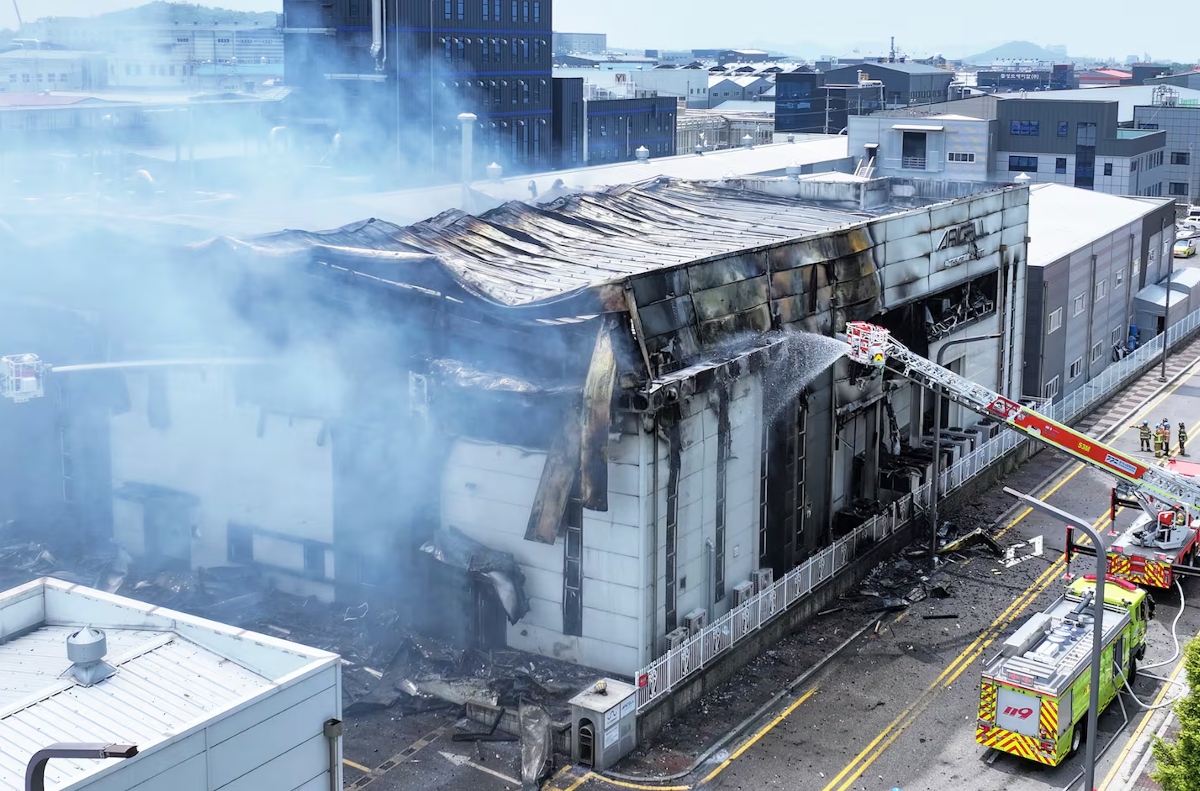Comments
- No comments found

A devastating factory fire, ignited by exploding lithium batteries, has claimed the lives of at least 16 people in South Korea.
The catastrophic blaze erupted on Monday morning at the Aricell plant in Hwaseong city, approximately 45 kilometers (28 miles) south of the capital, Seoul.
The inferno quickly spread through the factory, triggering a series of explosions that hampered firefighting efforts. Dramatic footage broadcast by local television stations captured the harrowing scene, with fireballs bursting from the facility and sections of the roof caving in as firefighters battled to control the flames.
Hwaseong is a significant hub in South Korea's burgeoning lithium battery industry. These batteries are integral to a wide array of modern technologies, from electric vehicles to laptops. The incident at the Aricell plant underscores the potential hazards associated with the production and storage of these high-energy cells.
Sim Jung-sik, the head of Hwaseong's medical authority, confirmed that 16 people had perished in the blaze, while seven others sustained injuries. The death toll is a stark reminder of the deadly potential of industrial accidents, particularly those involving volatile materials like lithium batteries.
The Aricell facility housed approximately 35,000 battery cells on its second floor, where they were subjected to inspection and packaging processes. Additional batteries were stored in other parts of the plant. According to local fire official Kim Jin-young, the disaster began with the explosion of several battery cells, though the precise cause of the initial detonation remains undetermined.
The fire broke out when around 100 workers were present in the facility, creating a chaotic and perilous situation. The immediate response was fraught with difficulty, as fears of further explosions made it challenging for rescue teams to enter the site safely.
Mr. Kim elaborated on the complexities of the firefighting operation, noting that "due to fears of additional explosions, it was difficult to enter the site initially." Lithium battery fires are notoriously difficult to manage, as they can react violently with water. Firefighters had to deploy dry sand to combat the blaze, a tactic necessitated by the nature of lithium fires which can reignite unpredictably due to ongoing chemical reactions.
This tragic incident highlights the inherent dangers of lithium battery production and storage. These batteries, while essential for modern technology, carry risks of overheating and explosion, particularly if they are damaged. Even after a fire appears to be extinguished, the possibility of reignition remains a serious concern.
In recent years, South Korea has established itself as a global leader in the lithium battery market, with numerous facilities dedicated to the production of these critical components. The Aricell plant in Hwaseong was part of this industrial landscape, contributing to the supply chain of batteries used in various high-tech applications.
The fire has prompted a reevaluation of safety protocols and emergency response strategies within the industry. Ensuring the safety of workers and minimizing the risk of such catastrophic events are now at the forefront of industry discussions.
As investigators work to determine the exact cause of the initial explosions, there is a growing call for enhanced safety measures in facilities handling lithium batteries. This includes improved monitoring of battery conditions, stricter storage guidelines, and more rigorous inspection processes to detect potential hazards before they can lead to disaster.
The incident at Aricell is a grim reminder of the balance that must be struck between technological advancement and safety. As the demand for lithium batteries continues to rise, so too must the commitment to safeguarding the lives of those involved in their production.
In the aftermath of the fire, the South Korean government is likely to intensify regulatory scrutiny of battery manufacturing plants. This could lead to the implementation of new safety standards designed to prevent similar incidents in the future. The goal will be to ensure that the industry can continue to innovate and grow without compromising the safety of its workforce.
The loss of life at the Aricell plant is a tragic consequence of the inherent dangers associated with lithium battery production. Moving forward, the lessons learned from this incident will be crucial in shaping a safer and more resilient industry. As the investigation continues, the focus will remain on preventing such tragedies from occurring again, ensuring that the advancements in technology do not come at the cost of human lives.
Felix is the founder of Society of Speed, an automotive journal covering the unique lifestyle of supercar owners. Alongside automotive journalism, Felix recently graduated from university with a finance degree and enjoys helping students and other young founders grow their projects.
Leave your comments
Post comment as a guest